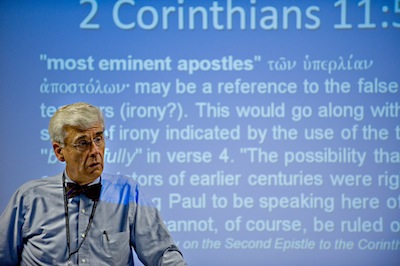“The Word became Flesh.”
John 1:14
[dropcap3]I[/dropcap3]t has been said that the Gospel of John is like a pool of water shallow enough for a child to splash about and deep enough for an elephant to take a thorough bath. Consider the notoriously simple line from John’s Prologue. Four words, three of them (two in Greek) monosyllabic: the essence of simplicity. Yet it is hard to exaggerate the scandals these words have triggered. Initially, they were morally repulsive to the Jews of Jesus’ time; how could the Eternal Invisible Unutterable God become human? Later, they became intellectually reprehensible to pagan philosophers. Celsus, for instance, in his late second century polemic against our faith, The True Word, wrote that “when Christians declare the Logos to be the Son of God, they present to view a most degraded man.”
It is an irony, then, that God’s salvation plan involves the Incarnation as a central divine choice. For the Incarnation at once propels believers forward in service to others, but at the same time distances us from those we seek to serve. Let me explain. On the one hand, “in the flesh” service is a direct result of the Incarnation. God chose to reveal himself sinlessly in a body and not by means of, say, a painting, or DVD, or analogue recording. In one sense, the Incarnation was a media choice for the Almighty. He could have selected any of a 1,001 media to reveal Himself, but He went with flesh. And the result is an insistent calling for us to incarnate ourselves in service: hence the Savior’s words, “as the Father sent me, so send I you” (John 20:21).

On the other hand, the Incarnation is an alienating doctrine, whether because it is misunderstood (Muslims), or deemed unnatural (Darwinian skeptics), or rejected as miraculous superstition (post-Christian theologians). A Christian’s calling to cultural engagement will always include this inherent irony to draw near humbly in the flesh while anticipating dismissal if not hostile rejection.
But let us not stop there. There is a second irony surrounding the Incarnation, and it speaks just as directly to the call for cultural engagement. God, having given His Son in flesh, returned Him to His right hand. The result? You and I may love Jesus, but we can’t see Him! So to know Him, we need to rely on a different “word,” the written word. To capture the incarnate Word for succeeding generations, God chose words in text (see John 17:20).
Again, notice the strong media choice of the Almighty and its irony: written word to capture the Living Word. It must sound rather disappointing in our iPod Touch world. Why didn’t God provide us with a full-color video file of Jesus’ person and work? After all, God understands digital technology; He created its component parts. But instead, He chose words on a page.
His media choice brings with it an ironic calling for believers in America’s virtual age. Simply put, because He chose to write, we are called to read – and read well. But reading is in decline, so much so that even the federal government is lamenting its loss. In the recent To Read or Not to Read, former head of the National Endowment for the Arts, Dana Gioia wrestled, with the fact that “both reading ability and the habit of regular reading have greatly declined among college graduates.” All the more reason, then, for believers to balance cultural engagement with skillful literacy: specifically, to remain committed to the study of words on paper, to the Book above all other media. It is through this Book that the Almighty works to re-incarnate His Son in us. And such people are the essence of what it means to be in the world but not of it, to be a redeemed humanity in an increasingly virtual culture.
These are the ironies of the Incarnation; these are the ironies of our calling.
[framed_box]Matt Ristuccia, D.Min, is the Senior Pastor of Westerly Road Church in Princeton, NJ. Rev. Ristuccia has taught as an adjunct professor in the School of Bible and Ministry since 1997, and was a keynote speaker at PBU’s 2008 Worldview Conference. He can be reached by emailing mattr@westerlyroad.org.
[/framed_box]